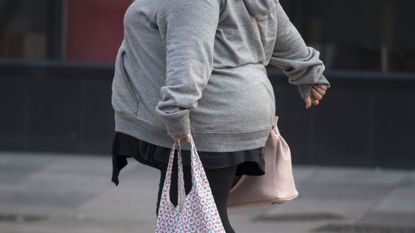The link between childhood obesity and midlife health crisis examined
Obese ten-year-olds are 25% more likely to suffer diabetes and high blood pressure by midlife, says new study

Obesity in childhood has been linked to multiple health problems in later life by a new study from University College London (UCL).
The research suggested that more than a third of middle-aged adults have multiple health problems, such as recurrent back problems, mental ill-health, high blood pressure, diabetes and high-risk drinking – with an increased risk for people who were overweight or obese by the age of ten.
Researchers from UCL have been tracking almost 8,000 “Generation X” adults since they were born and found that 34% aged between 46 and 48 have two or more long-term health conditions, reports The Telegraph.
Subscribe to The Week
Escape your echo chamber. Get the facts behind the news, plus analysis from multiple perspectives.

Sign up for The Week's Free Newsletters
From our morning news briefing to a weekly Good News Newsletter, get the best of The Week delivered directly to your inbox.
From our morning news briefing to a weekly Good News Newsletter, get the best of The Week delivered directly to your inbox.
Those who were obese ten-year-olds were 25% more likely to suffer the combination of diabetes and high blood pressure by midlife. For every one-point decrease in Body Mass Index (BMI) by the age of ten, there was a 3% fall in the risk of midlife health problems.
“Lower birthweight, and emotional problems in adolescence also increased the chance of multiple chronic health problems, such as diabetes, high blood pressure and back pain, in middle age,” reports the paper.
The research, published in the BMC Public Health journal, is said to be the first major study to track the impact of childhood obesity over a lifetime.
While the findings were “not directly compared with previous generations”, the paper researchers said it suggested “a decline in healthy lifestyles”.
The lead author on the study, Dr Dawid Gondek, said: “This study provides concerning new evidence about the state of the nation’s health in midlife.
“It shows that a substantial proportion of the population are already suffering from multiple long-term physical and mental health problems in their late 40s, and also points to stark health inequalities which appear to begin early in childhood.”
According to government data, obesity is “one of the biggest health crises the country faces”, costing the NHS a staggering £6bn a year.
Almost two-thirds (63%) of adults in England are overweight or living with obesity – while one in three children leave primary school overweight or obese, according to government figures.
Last week, the government announced a new strategy aimed at tackling what it dubbed “the obesity time bomb”, with a renewed focus on managing the weight of the nation “brought to the fore by evidence of the link to an increased risk from Covid-19”.
The strategy includes a national rewards programme where “loyalty points” could be accumulated by buying healthier foods and increasing exercise, which could be exchanged for discounts, free tickets and other possible incentives.
Create an account with the same email registered to your subscription to unlock access.
Sign up for Today's Best Articles in your inbox
A free daily email with the biggest news stories of the day – and the best features from TheWeek.com
-
 Nigeria's worsening rate of maternal mortality
Nigeria's worsening rate of maternal mortalityUnder the radar Economic crisis is making hospitals unaffordable, with women increasingly not receiving the care they need
By Harriet Marsden, The Week UK Published
-
 'Elevating Earth Day into a national holiday is not radical — it's practical'
'Elevating Earth Day into a national holiday is not radical — it's practical'Instant Opinion Opinion, comment and editorials of the day
By Harold Maass, The Week US Published
-
 UAW scores historic win in South at VW plant
UAW scores historic win in South at VW plantSpeed Read Volkswagen workers in Tennessee have voted to join the United Auto Workers union
By Peter Weber, The Week US Published
-
 Why Americans are getting shorter
Why Americans are getting shorterUnder the radar Wealth inequality handed the country's citizens the short end of the stick
By Devika Rao, The Week US Published
-
 2023: the year of the weight-loss drug craze
2023: the year of the weight-loss drug crazethe explainer From celebs to social media, Ozempic was everywhere this year
By Theara Coleman, The Week US Published
-
 Obesity drugs: is new ‘skinny jab’ a game changer or a quick-fix fad?
Obesity drugs: is new ‘skinny jab’ a game changer or a quick-fix fad?Today's Big Question Weight-loss injection loved by celebrities has been given the green light by the NHS
By Arion McNicoll Published
-
 Do vegans live longer?
Do vegans live longer?feature Plant-based lifestyles can drastically lower rates of some serious diseases
By Chas Newkey-Burden Published
-
 Non-Covid excess deaths: why are they rising?
Non-Covid excess deaths: why are they rising?Why Everyone’s Talking About Experts call for probe as mortality rates in England and Wales climb despite drop in coronavirus deaths
By Richard Windsor Published
-
 The true story of Germany’s Covid-19 response
The true story of Germany’s Covid-19 responseWhy Everyone’s Talking About Once lauded for its rapid response, Berlin’s excess death rate is now higher than many of its neighbours
By The Week Staff Published
-
 Arguments for and against calorie-count menus
Arguments for and against calorie-count menusPros and Cons Restaurants and cafes face controversial new rules for their menus
By The Week Staff Published
-
 The rise in children’s hepatitis
The rise in children’s hepatitisWhy Everyone’s Talking About Surge in cases has been linked to lockdown restrictions
By The Week Staff Published